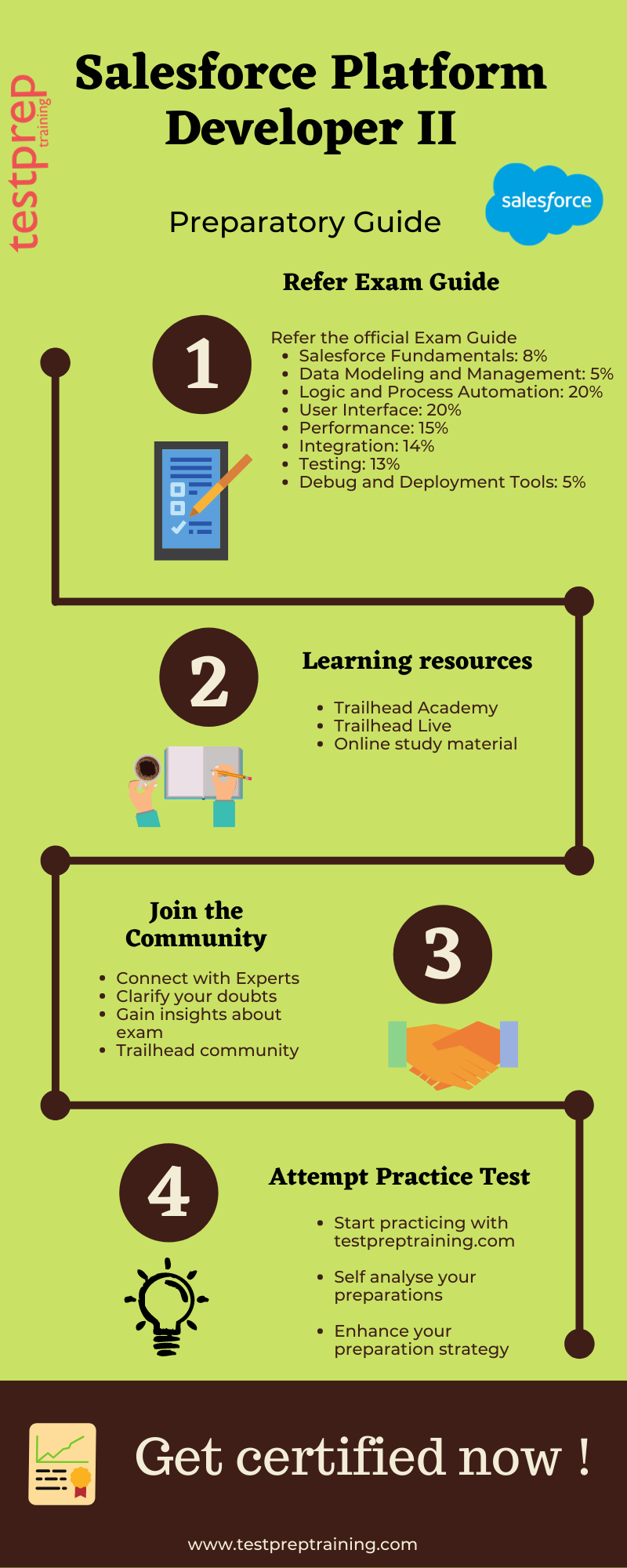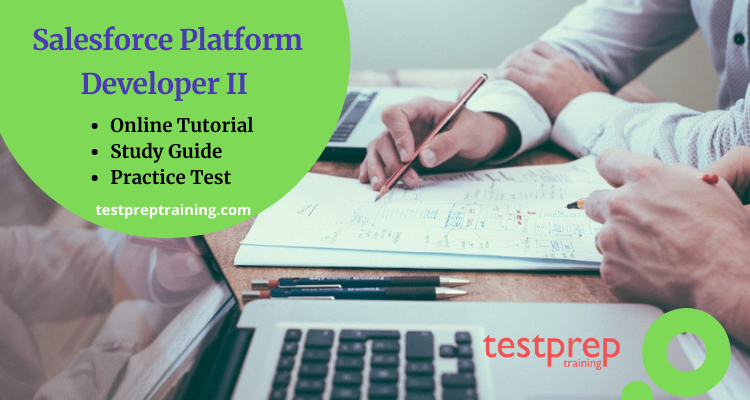The Salesforce Platform Developer II exam is a certification exam designed to test the knowledge and skills of Salesforce developers who have already earned their Platform Developer I certification. The exam covers advanced-level topics related to the design and implementation of Salesforce applications, including Apex development, integration with external systems, Lightning Components, and advanced data modeling. Successful completion of the exam demonstrates a developer’s ability to design and develop complex Salesforce solutions that meet the needs of their organization or clients.
Salesforce Platform Developer II Exam Glossary
- Apex: Salesforce’s proprietary programming language used to create custom functionality in Salesforce applications.
- Visualforce: A framework used to build custom user interfaces for Salesforce applications.
- Lightning Components: A user interface framework that allows the development of reusable UI components that can be used to build custom Salesforce applications.
- SOQL: Salesforce Object Query Language used to search for data in Salesforce databases.
- SOSL: Salesforce Object Search Language used to search for data across multiple Salesforce objects.
- Governor Limits: Limits set by Salesforce on the amount of resources an Apex code can consume, such as CPU time, database calls, and heap size.
- Test Classes: Classes written to test Apex code in Salesforce to ensure that it functions correctly.
- Apex Trigger: A type of Apex code that executes before or after a record is inserted, updated, or deleted in Salesforce.
- Batch Apex: Apex code that is designed to process large amounts of data in Salesforce by dividing the data into manageable chunks.
- REST API: A Representational State Transfer (REST) API used to interact with Salesforce data through HTTP requests.
- Lightning Web Components: A modern web standard used to build custom user interfaces for Salesforce applications.
- Salesforce Connect: A feature that enables Salesforce to access and display data from external systems in real-time.
- Metadata API: An API used to manage Salesforce metadata, such as custom objects, fields, and layouts.
- Apex Design Patterns: Best practices for designing and developing Apex code in Salesforce.
- Continuous Integration: A practice of continuously building and testing Salesforce code changes to ensure that they work correctly.
Salesforce Platform Developer II Exam Guide
Here are some official resources for the Salesforce Platform Developer II exam:
- Salesforce Certification website: https://trailhead.salesforce.com/credentials/platformdeveloperii
- Exam guide: https://trailhead.salesforce.com/help?article=Salesforce-Certified-Platform-Developer-II-Exam-Guide
- Trailhead modules: https://trailhead.salesforce.com/credentials/platformdeveloperii
- Trailmix: https://trailhead.salesforce.com/en/users/strailhead/trailmixes/prepare-for-your-salesforce-platform-developer-ii-credential
- Learn Salesforce Developer documentation: https://developer.salesforce.com/docs/
- Salesforce Developer blog: https://developer.salesforce.com/blogs/
- Learn Salesforce Success Community: https://success.salesforce.com/
- Salesforce Stack Exchange: https://salesforce.stackexchange.com/
It’s important to note that the Salesforce Platform Developer II exam has recently been updated to align with the latest release of Salesforce. Be sure to review the updated exam guide and relevant resources before taking the exam.
Salesforce Platform Developer II Exam Tips and Tricks
Here are some tips and tricks for the Salesforce Platform Developer II exam:
- Understand the Exam Format: The Salesforce Platform Developer II exam consists of 60 multiple-choice questions that must be completed within 120 minutes. The exam covers a variety of topics related to Salesforce development, including Apex, Visualforce, Lightning, and integration.
- Study the Official Exam Guide: Salesforce provides an official exam guide that outlines the topics covered on the exam. Review this guide carefully and make sure you have a solid understanding of each topic.
- Know Your Limits: Don’t try to cram for the exam. Instead, study consistently over a period of time. Understand your strengths and weaknesses and focus on the areas where you need the most improvement.
- Hands-on Experience: The Salesforce Platform Developer II exam is designed to test your practical knowledge of Salesforce development. So, make sure you have hands-on experience with Salesforce and have worked on multiple projects.
- Practice Tests: Take practice tests to familiarize yourself with the exam format and types of questions asked. Salesforce provides official practice tests that can be accessed on their website.
- Exam Day Preparation: Make sure you are well-rested and have eaten a healthy meal before the exam. Arrive early at the exam center to avoid any last-minute stress. Bring a valid ID and a printed copy of your exam confirmation.
Preparatory Guide for Salesforce Platform Developer II exam
Planning is the key to getting you closer to your academic goals. The most important thing you can do to ensure your ultimate success is to plan. Your outcome will be determine by the degree and quality of your preparation. To pass the test, you must put up a great deal of work and devotion, as well as exceptional initiative. Because you are on the path to preparing for the test, your study resources should be completely appropriate and legitimate in order for you to prepare well. Here’s a comprehensive Preparatory guide to assist you to plan out a good approach for the preparations.

1. Study Resources from the Official Site
To begin, each candidate must go to the official website. You will find the most reliable materials here. In addition, you will receive frequent exam updates. If you’re studying for a Salesforce certification, the Trailmix site is a must-visit. This is what you’ll find on this website. –
Trailmix: Prepare for Your Salesforce Platform App Builder Credential
Task sheets, documentation, modules, and badges are all available on this area of the website. These parts will assist you in preparing for various themes in the exam’s course outline. This page’s content has been create and curated by the experts. As a result, you’ll never miss a detail concerning the certification.
The topics include:
Advanced Developer Fundamentals: 15%
- Demonstrate knowledge of localization and multi-currency features and capabilities and how they affect coding.
- Given a scenario, justify using sharing objects and Apex managed sharing.
- Given a scenario, identify best practices for various types of custom metadata and custom settings, and how to implement required solutions.
Process Automation, Logic, and Integration: 27%
- Given a scenario, identify the considerations of interactions between multiple processes, both declarative and programmatic. (Salesforce Documentation: Identify Tools to Build Your App)
- Given a scenario, propose and justify the optimal programmatic or declarative solution.
- Demonstrate knowledge of the best practices for writing Apex triggers. (Salesforce Documentation: Trigger and Bulk Request Best Practices)
- Describe the Apex features available for error handling and maintaining transactional integrity. (Salesforce Documentation: Error Handling Best Practices for Lightning and Apex, Exceptions in Apex)
- Demonstrate how and where to use advanced keywords in a SOQL query structure.
- Analyze a set of requirements and determine the benefits of using asynchronous Apex coding. (Salesforce Documentation: Asynchronous Processing Basics)
- Given a scenario and requirements, identify the appropriate dynamic Apex feature to use in the solution. (Salesforce Documentation: Dynamic Apex)
- Given a scenario, identify the appropriate publish / subscribe logic for platform events.
- Given a scenario, apply programmatic integration techniques and platform features for inbound and outbound communication.
User Interface: 20%
- Given requirements and code snippets for a Lightning Web Component or Aura Component and its Apex controller class, analyze and determine necessary changes to the Apex class. (Salesforce Documentation: Testing Custom Controllers and Controller Extensions)
- Identify the techniques for using Visualforce to perform actions, partial page refreshes, and asynchronous operations. (Salesforce Documentation: Implementing Partial Page Updates with Command Links and Buttons)
- Given a scenario, identify best practices for displaying errors in the user interface.
- Given a set of requirements, select the appropriate Lightning Web Component, Aura Component, or Visualforce solution and describe its benefits. (Salesforce Documentation: Use Lightning Components in Lightning Experience, Dynamic Lightning Pages)
- Given a scenario, describe the aspects of Lightning Web Components or Aura Components that can be used to cause elements in a component’s markup to display in a responsive manner based on a device’s form factor.
- Given a scenario, implement the correct method to communicate events through Lightning Web Components or Aura Components. (Salesforce Documentation: Communicating with Events)
- Describe the purpose and benefit of static resources in Visualforce, Lightning Web Components, and Aura Components. (Salesforce Documentation: Use Static Resources)
Testing, Debugging, and Deployment: 20%
- Apply advanced techniques and tools for testing Apex classes and triggers, such as mocks and stubs. (Salesforce Documentation: Testing Apex)
- Apply techniques and tools for testing and debugging Lightning Web Components, Aura Components, and Visualforce controllers, Visualforce controller extensions, and JavaScript.
- Given a scenario, Apex code, Apex trigger, or Apex test that is not executing as expected, apply techniques and tools to isolate and identify the root cause.
- Given a scenario, formulate the deployment process, supporting tools, and mechanisms for source-driven development.
Performance: 18%
- Identify the common performance issues for user interfaces and demonstrate knowledge of techniques and tools to mitigate them. (Salesforce Documentation: Lightning Knowledge)
- Given a scenario, choose the appropriate logic and query structure to maximize application performance and handle large data volumes. (Salesforce Documentation: Working with Very Large SOQL Queries)
- Analyze a given scenario and determine performance improvements that can be achieved with an asynchronous callout. (Salesforce Documentation: Process for Using Asynchronous Callouts)
- Select scenarios where code reuse is applicable and how the reuse should be implemented. (Salesforce Documentation: Learn About Code Reuse and Apex Controllers)
- Given sample code, identify inefficiencies and demonstrate the ability to resolve them. (Salesforce Documentation: Optimize Lightning Experience Performance)
2. Join the Trailblazers Community
One of the most powerful and active internet communities is the Trailblazers. Because of the unique structure, members not only work to achieve shared goals, but they also have assisted learning, in which individuals with more expertise educate younger members about more sophisticated subjects. They also encourage member and leader engagement by giving everyone a voice, including each team, which has its own emphasis area that we assist them in deciding and voting on as a group. As a result, the Trailblazers Community is a collection of those who want to attain both large and little goals. So, it is recommend that you participate actively in this community.
3. Evaluate Yourself with Practice Tests
Practice is a crucial part of taking a certification test since it helps you prepare better for it. Practicing the example questions will aid in the development of precision and the ability to solve the problems quickly. It will also help you acquire confidence in your knowledge and reduce your anxiety during the certification exam. If you want to gain a sense of what to expect on the actual exam, taking practice exams is a wonderful option. You might be able to keep track of your preparations. Understanding the format of the final exam is critical since it will help you feel more safe and steady during taking the test. For all of these reasons, taking many practise examinations is vital.
Experts Corner
Salesforce examinations are design to evaluate your knowledge and skills in the appropriate areas. They also assess your ability to complete all actions in order to meet the needs of clients, customers, employers, and others. However, there are several tools available to help you prepare for the test. So, there is no doubt that you must prepare thoroughly in order to achieve the highest possible mark on your Salesforce certification test. Practice with a Salesforce test is an important component of preparation since it helps you get enough information about the areas cover in the exam.


